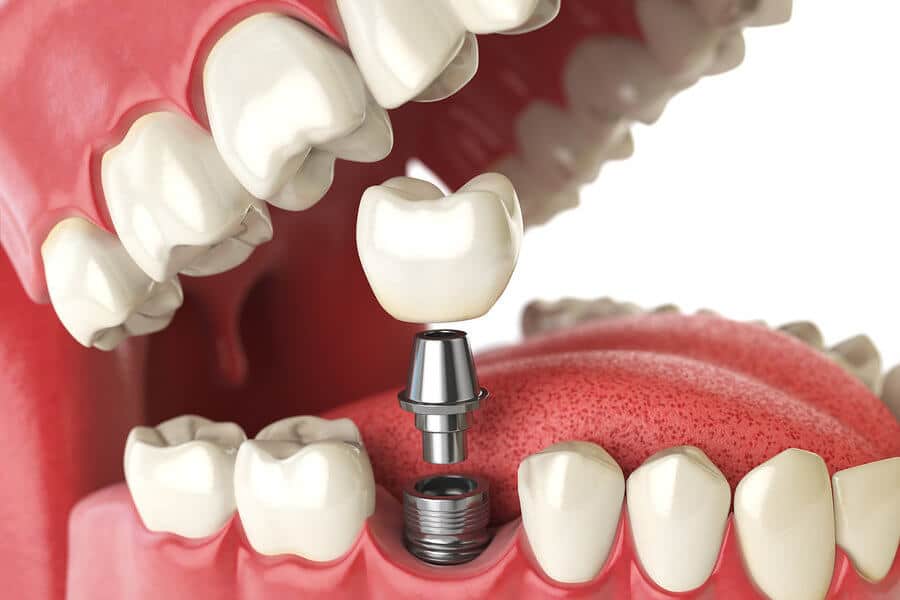You may have received mixed messages about mini implants and if they can be a solution to your dental needs. If you decide to move forward with any type of implant you should be well versed in the required dental implants before and after care. You should practice proper oral hygiene prior to an implant procedure. Your after care will depend on what type of implant you and your dental professional select.
There are pros and cons to this technology. A mini implant is exactly what it sounds like; a smaller version of a regular implant. The lengths of the implants are similar but the difference is in the size of the diameter. The actual size difference will depend on where in the mouth the implant is going to be installed. Read on for the benefits and drawback of mini implants. The more knowledge you have the more able you will be to make an informed decision.
Benefits to mini implants:
- The overall procedure is usually much less invasive. Mini implants are similar to regular implants but the procedure to install them is much less intensive. This is in part due to the fact mini implants do not require flap surgery and usually don’t need bone grafts.
- The healing time is significantly shorter allowing you to return to work and your normal activities much more quickly. Because the procedure is typically less extensive, the healing time can be a matter of days instead of months. This allows you to get back on your feet much faster.
- The procedure is convenient. The mini implants can usually be installed in one office visit and patients can recover much more quickly.
- The mini implants are an excellent dental alternative for people that don’t have enough bone for a traditional implan Because of their size a traditional implant needs a much larger bone to be anchored to. If the bone has been damaged or diminished in size, there may not be enough stable material to work with. With the smaller size implants, the material needed is not nearly as large.
- Mini implants can prevent facial collapse. Mini implants are fixed into your jaw bone similar to a tooth root. With missing teeth, the jawbone can shrink in a condition called facial collapse. The body notices the lack of teeth and processes it as an indication the space is no longer needed. This can create a shrinking jaw line that in turn creates a look of a sagging face. Implants act as pseudo-teeth, indicating that the jawbone is still needed, and preventing the facial sagging.
- Mini implants can help anchor different types of dentures and make the wearer feel much more comfortable. People can feel self-conscious due to tooth loss or denture replacements. A mini implant can be used denture stabilization or missing and loose teeth. These implants can give the wearer more confidence in his or her dental work and smile.
Potential down sides to mini implants:
- Vertical bone requirement. Mini implants don’t require as much bone as a regular implant but do need enough vertical bone to be properly installed. If there has been too much bone deterioration, they may not be able to be installed.
- Mini implants typically have a shorter shelf life than regular implants as they have to endure the same wear and tear but with less size to withstand every day dental needs. Warranties on mini implants tend to be much shorter than regular sized implants. Many people would consider mini implants a cost effective alternative to regular implants. If a mini implant needs to be replaced, it could end up being much more expensive in the long run.
- If you grind your teeth, these may not be a viable option for you. The force of the grinding may wear down your mini-implant prematurely forcing you to replace it much earlier than you would like.
- Placement is a consideration. If the implants are placed where they would be subject to the regular force of chewing such as molars it might be more prudent to use regular size implants. High impact areas may wear down and damage mini implants much more quickly.
- If something happens to your mini-implant the entire thing has to be replaced. The mini implant is one small piece which means that if it suffers any type of damage the entire thing will need to be replaced. A regular sized implant is usually comprised of a two part system, an implant which anchors the implant and an abutment which supports the crown or denture. If a regular sized implant suffers damage it is usually to the abutment, which can be easily replaced while the implant that is anchored stays intact.
- Mini implants are considered relatively new. They were originally used as temporary anchors with braces and have recently found widespread use for stabilizing dentures and crowns. There is an argument that because these uses have not been established for a long period of time, we don’t yet know the long term consequences of their use in this capacity.
- Additionally, the training for mini implant use may be lacking. Some professionals do not have the required training needed. A dentist needs to consider the cosmetic and oral health of the patient when assessing the viability of any type of dental implant.
Please note that East Valley Dental Professionals does not perform dental implant procedures–we do dental implant reconstruction. This information has been provided for educational purposes only. You are more than welcome to contact us to set up an appointment to discuss which approach is right for you.

